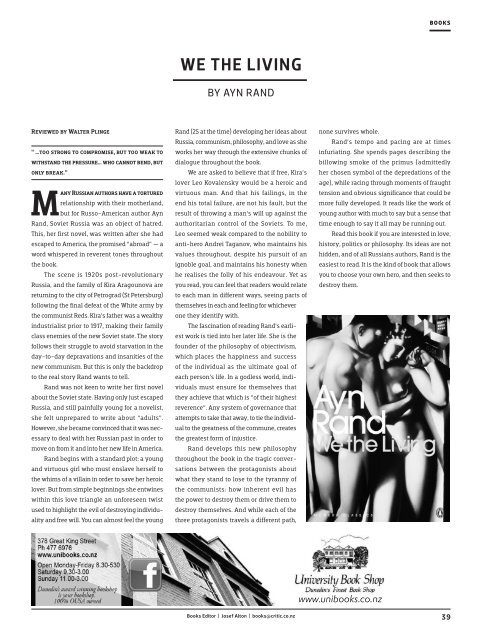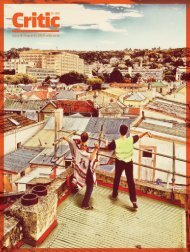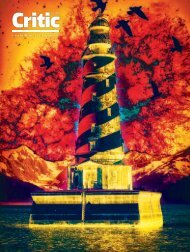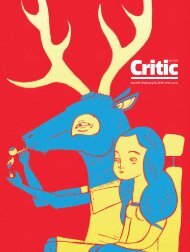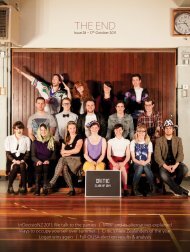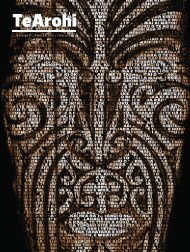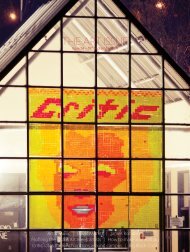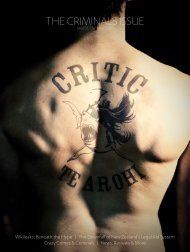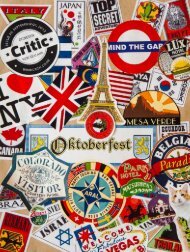Issue 20 | August 13,2012 | critic.co.nz
Issue 20 | August 13,2012 | critic.co.nz
Issue 20 | August 13,2012 | critic.co.nz
Create successful ePaper yourself
Turn your PDF publications into a flip-book with our unique Google optimized e-Paper software.
Reviewed by Walter Plinge<br />
“ …too strong to <strong>co</strong>mpromise, but too weak to<br />
withstand the pressure… who cannot bend, but<br />
only break.”<br />
Many Russian authors have a tortured<br />
relationship with their motherland,<br />
but for Russo-American author Ayn<br />
Rand, Soviet Russia was an object of hatred.<br />
This, her first novel, was written after she had<br />
escaped to America, the promised “abroad” — a<br />
word whispered in reverent tones throughout<br />
the book.<br />
The scene is 19<strong>20</strong>s post-revolutionary<br />
Russia, and the family of Kira Aragounova are<br />
returning to the city of Petrograd (St Petersburg)<br />
following the final defeat of the White army by<br />
the <strong>co</strong>mmunist Reds. Kira’s father was a wealthy<br />
industrialist prior to 1917, making their family<br />
class enemies of the new Soviet state. The story<br />
follows their struggle to avoid starvation in the<br />
day-to-day depravations and insanities of the<br />
new <strong>co</strong>mmunism. But this is only the backdrop<br />
to the real story Rand wants to tell.<br />
Rand was not keen to write her first novel<br />
about the Soviet state. Having only just escaped<br />
Russia, and still painfully young for a novelist,<br />
she felt unprepared to write about “adults”.<br />
However, she became <strong>co</strong>nvinced that it was necessary<br />
to deal with her Russian past in order to<br />
move on from it and into her new life in America.<br />
Rand begins with a standard plot: a young<br />
and virtuous girl who must enslave herself to<br />
the whims of a villain in order to save her heroic<br />
lover. But from simple beginnings she entwines<br />
within this love triangle an unforeseen twist<br />
used to highlight the evil of destroying individuality<br />
and free will. You can almost feel the young<br />
WE THE LIvING<br />
By ayn ranD<br />
Rand (25 at the time) developing her ideas about<br />
Russia, <strong>co</strong>mmunism, philosophy, and love as she<br />
works her way through the extensive chunks of<br />
dialogue throughout the book.<br />
We are asked to believe that if free, Kira’s<br />
lover Leo Kovalensky would be a heroic and<br />
virtuous man. And that his failings, in the<br />
end his total failure, are not his fault, but the<br />
result of throwing a man’s will up against the<br />
authoritarian <strong>co</strong>ntrol of the Soviets. To me,<br />
Leo seemed weak <strong>co</strong>mpared to the nobility to<br />
anti-hero Andrei Taganov, who maintains his<br />
values throughout, despite his pursuit of an<br />
ignoble goal, and maintains his honesty when<br />
he realises the folly of his endeavour. Yet as<br />
you read, you can feel that readers would relate<br />
to each man in different ways, seeing parts of<br />
themselves in each and feeling for whichever<br />
one they identify with.<br />
The fascination of reading Rand’s earliest<br />
work is tied into her later life. She is the<br />
founder of the philosophy of objectivism,<br />
which places the happiness and success<br />
of the individual as the ultimate goal of<br />
each person’s life. In a godless world, individuals<br />
must ensure for themselves that<br />
they achieve that which is “of their highest<br />
reverence”. Any system of governance that<br />
attempts to take that away, to tie the individual<br />
to the greatness of the <strong>co</strong>mmune, creates<br />
the greatest form of injustice.<br />
Rand develops this new philosophy<br />
throughout the book in the tragic <strong>co</strong>nversations<br />
between the protagonists about<br />
what they stand to lose to the tyranny of<br />
the <strong>co</strong>mmunists: how inherent evil has<br />
the power to destroy them or drive them to<br />
destroy themselves. And while each of the<br />
three protagonists travels a different path,<br />
Books Editor | Josef Alton | books@<strong>critic</strong>.<strong>co</strong>.<strong>nz</strong><br />
none survives whole.<br />
Rand’s tempo and pacing are at times<br />
infuriating. She spends pages describing the<br />
billowing smoke of the primus (admittedly<br />
her chosen symbol of the depredations of the<br />
age), while racing through moments of fraught<br />
tension and obvious significance that <strong>co</strong>uld be<br />
more fully developed. It reads like the work of<br />
young author with much to say but a sense that<br />
time enough to say it all may be running out.<br />
Read this book if you are interested in love,<br />
history, politics or philosophy. Its ideas are not<br />
hidden, and of all Russians authors, Rand is the<br />
easiest to read. It is the kind of book that allows<br />
you to choose your own hero, and then seeks to<br />
destroy them.<br />
www.unibooks.<strong>co</strong>.<strong>nz</strong><br />
books<br />
39


